- Home
- Alice Munro
Dear Life: Stories Page 4
Dear Life: Stories Read online
Page 4
Besides Matron there were three registered nurses, not one of them within thirty years of my age. They had come out of retirement to serve, doing their wartime duty. Then there were the nurse’s aides, who were my age or even younger, mostly married or engaged or working on being engaged, generally to men in the forces. They talked all the time if Matron and the nurses weren’t there. They didn’t have the least interest in me. They didn’t want to know what Toronto was like, though some of them knew people who had gone there on their honeymoons, and they did not care how my teaching was going or what I had done before I came to work at the San. It wasn’t that they were rude—they passed me the butter (it was called butter but it was really orange-streaked margarine, colored in the kitchen as was the only legal way in those days) and they warned me off the shepherd’s pie which they said had groundhog in it. It was just that whatever happened in places they didn’t know or to people they didn’t know or in times they didn’t know had to be discounted. It got in their way and under their skin. They turned off the radio news every chance they got and tried to get music.
“Dance with a dolly with a hole in her stockin’ …”
Both nurses and aides disliked the CBC which I had been brought up to believe was bringing culture to the hinterlands. Yet they were in awe of Dr. Fox partly because he had read so many books.
They also said that there was nobody like him to tear a strip off you if he felt like it.
I couldn’t figure out if they felt there was a connection between reading a lot of books and tearing a strip off.
Usual notions of pedagogy out of place here. Some of these children will reenter the world or system and some will not. Better not a lot of stress. That is testing memorizing classifying nonsense.
Disregard whole grade business entirely. Those who need to can catch up later on or do without. Actually very simple skills, set of facts, etc., necessary for Going into the World. What about Superior Children so-called? Disgusting term. If they are smart in questionable academic way they can easily catch up.
Forget rivers of South America, likewise Magna Carta.
Drawing Music Stories preferred.
Games Okay but watch for overexcitement or too much competitiveness.
Challenge to keep between stress and boredom. Boredom curse of hospitalization.
If Matron can’t supply what you need sometimes Janitor will have it stashed away somewhere.
Bon Voyage.
The numbers of children who showed up varied. Fifteen, or down to half a dozen. Mornings only, from nine o’clock till noon, including rest times. Children were kept away if their temperature had risen or if they were undergoing tests. When they were present they were quiet and tractable but not particularly interested. They had caught on right away that this was a pretend school where they were free of all requirements to learn anything, just as they were free of times-tables and memory work. This freedom didn’t make them uppity, it didn’t make them bored in any troublesome way, just docile and dreamy. They sang rounds softly. They played X’s and O’s. There was a shadow of defeat over the improvised classroom.
I decided to take the doctor at his word. Or some of his words, such as the ones about boredom being the enemy.
In the janitor’s cubbyhole I had seen a world globe. I asked to have it brought out. I started on simple geography. The oceans, the continents, the climates. Why not the winds and the currents? The countries and the cities? The Tropic of Cancer and the Tropic of Capricorn? Why not, after all, the rivers of South America?
Some children had learned such things before, but they had nearly forgotten. The world beyond the lake and the forest had dropped away. I thought they cheered up, as if making friends again, with whatever they used to know. I didn’t dump everything on them at once, of course. And I had to go easy with the ones who had never learned such things in their lives because of getting sick too soon.
But that was all right. It could be a game. I separated them into teams, got them calling out answers while I darted here and there with the pointer. I was careful not to let the excitement go on too long. But one day the doctor walked in, fresh from morning surgery, and I was caught. I could not stop things cold, but I tried to dampen the competition. He sat down, looking somewhat tired and withdrawn. He made no objection. After a few moments he began to join in the game, calling out quite ridiculous answers, names not just mistaken but imaginary. Then gradually he let his voice die down. Down, down, first to a mumble, then to a whisper, then till nothing could be heard at all. Nothing. In this way, with this absurdity, he took control of the room. The whole class took to mouthing, in order to imitate him. Their eyes were fixed on his lips.
Suddenly he let out a low growl that had them all laughing.
“Why the deuce is everybody looking at me? Is that what your teacher teaches you? To stare at people who aren’t bothering anybody?”
Most laughed, but some couldn’t stop watching him even for that. They were hungry for further antics.
“Go on. Go off and misbehave yourselves somewhere else.”
He apologized to me for breaking up the class. I began to explain to him my reasons for making this more like real school.
“Though I do agree with you about stress—” I said earnestly. “I agree with what you said in your instructions. I just thought—”
“What instructions? Oh, that was just some bits and pieces that went through my head. I never meant them to be set in stone.”
“I mean as long as they are not too sick—”
“I’m sure you’re right, I don’t suppose it matters.”
“Otherwise they seemed sort of listless.”
“There’s not any need to make a song and dance about it,” he said, and walked away.
Then turned to make a barely halfhearted apology.
“We can have a talk about it some other time.”
That time, I thought, would never come. He evidently thought me a bother and a fool.
I discovered at lunch, from the aides, that somebody had not survived an operation that morning. So my anger did not turn out to be justified, and for that reason I had to feel more of a fool.
Every afternoon was free. My pupils went down for long naps and I sometimes felt like doing the same. My room was cold—every part of the building seemed cold, far colder than the apartment on Avenue Road, even though my grandparents kept the radiators turned low there, to be patriotic. And the covers were thin—surely people with tuberculosis needed something cozier.
I of course did not have tuberculosis. Maybe they skimped on provisions for people like me.
I was drowsy but couldn’t sleep. Overhead there was the rumble of bed-carts being wheeled to the open porches for the icy afternoon exposure.
The building, the trees, the lake, could never again be the same to me as they were on that first day, when I was caught by their mystery and authority. On that day I had believed myself invisible. Now it seemed as if that was never true.
There’s the teacher. What’s she up to?
She’s looking at the lake.
What for?
Nothing better to do.
Some people are lucky.
Once in a while I skipped lunch, even though it was part of my salary. I went in to Amundsen, where I ate in a coffee shop. The coffee was Postum and the best bet for a sandwich was tinned salmon, if they had any. The chicken salad had to be looked over well for bits of skin and gristle. Nevertheless I felt more at ease there, as if nobody would know who I was.
About that I was probably mistaken.
The coffee shop didn’t have a ladies’ room, so you had to go next door to the hotel, then past the open door of the beer parlor, always dark and noisy and letting out a smell of beer and whiskey, a blast of cigarette and cigar smoke fit to knock you down. Nevertheless I felt easy enough there. The loggers, the men from the sawmill, would never yelp at you the way the soldiers and the airmen in Toronto did. They were deep down in a world of men, bawling o
ut their own stories, not here to look for women. Possibly more eager in fact to get away from that company now or forever.
The doctor had an office on the main street. Just a small one-story building so he must live elsewhere. I had picked up from the aides that there was no wife. On the only side street I found the house that might possibly belong to him—a stucco-covered house with a dormer window over the front door, books stacked on the sill of that window. There was a bleak but orderly look to the place, a suggestion of minimal but precise comfort, that a lone man—a regulated lone man—might contrive.
The school at the end of that only residential street was two stories high. The downstairs served students up to grade eight, the upstairs to grade twelve. One afternoon I spotted Mary there, taking part in a snowball fight. It seemed to be girls against boys. When she saw me, Mary cried out loudly, “Hey, Teach,” and gave the balls in both hands a random toss, then sauntered across the street. “See you tomorrow,” she called over her shoulder, more or less as a warning that nobody was to follow.
“You on your way home?” she said. “Me too. I used to ride with Reddy, but he’s got too late leaving. What do you do, take the tram?”
I said yes, and Mary said, “Oh I can show you the other way and you can save your money. The bush road.”
She took me up a narrow but passable track looking down on the town, then running through the woods and past the sawmill.
“This is the way Reddy goes,” she said. “It’s higher up but shorter when you turn down at the San.”
We passed the sawmill, and beneath us, some ugly cuts in the woods and a few shacks, apparently inhabited because they had woodpiles and clotheslines and rising smoke. From one of them a big wolfish dog ran out with a great display of barking and snarling.
“You shut your face,” yelled Mary. In no time she had packed and flung a snowball which caught the animal between the eyes. It whirled around and she had another snowball ready to catch it in the rump. A woman in an apron came out and yelled, “You could of killed him.”
“Good riddance to bad rubbish.”
“I’ll get my old man after you.”
“That’ll be the day. Your old man can’t hit a shithouse.”
The dog followed at a distance, with some insincere threatening.
“I can take care of any dog, don’t worry,” Mary said. “I bet I could take care of a bear if we ran into one.”
“Don’t bears tend to hibernate at this time of year?”
I had been quite scared by the dog but affected carelessness.
“Yeah, but you never know. One came out early and it got into the garbage down at the San. My mom turned around and there it was. Reddy got his gun and shot it.
“Reddy used to take me and Anabel out on the sled, and sometimes other kids too and he had a special whistle that scared off bears. It was pitched too high for the ears of humans.”
“Really. Did you see it?”
“It wasn’t that kind. I meant one he could do with his mouth.”
I thought of the performance in the classroom.
“I don’t know, maybe that was just to keep Anabel from getting scared he said that. She couldn’t ride, he had to pull her on a toboggan. I’d go right behind her and sometimes I’d jump on the toboggan and he’d say what’s the matter with this thing, it weighs a ton. Then he’d try to turn around quick and catch me, but he never did. And he’d ask Anabel what makes it so heavy what did you have to eat for breakfast, but she never told. If there was other kids I wouldn’t do it. It was best when just me and Anabel went. She was the best friend I ever will have.”
“What about those girls at the school? Aren’t they friends?”
“I just hang around with them when there’s nobody else. They’re nothing.
“Anabel and me had our birthdays in the same month. June. Our eleventh birthday Reddy took us down the lake in a boat. He taught us swimming. Well, me. He always had to hold Anabel though, she couldn’t really learn. Once he went swimming way out by himself and we filled his shoes up with sand. And then our twelfth birthday we couldn’t go anywhere like that, but we went to his house and had a cake. She couldn’t eat even a little piece of it, so he took us in his car and we threw pieces out the window and fed the seagulls. They were fighting and screaming like mad. We were laughing ourselves crazy and he had to stop and hold Anabel so she wouldn’t have a hemorrhage.
“And after that,” she said, “after that I wasn’t allowed to see her anymore. My mom never wanted me anyway to hang around with kids that had TB. But Reddy talked her into it, he said he’d stop it when he had to. So he did and I got mad. But she wouldn’t have been any fun anymore she was too sick. I’d show you her grave but there isn’t anything to mark it yet. Reddy and me are going to make something when he gets time. If we’d’ve gone straight along on the road instead of turning down where we did we would have come to her graveyard. It’s just for people that don’t have anybody to come and take them home.”
By this time we were down on level ground approaching the San.
She said, “Oh I almost forgot,” and brought out a fistful of tickets.
“For Valentine’s Day. We’re putting on this play at the school and it’s called Pinafore. I got all these to sell and you can be my first sale. I’m in it.”
I was right about the house in Amundsen being where the doctor lived. He took me there for supper. The invitation seemed to come rather on the spur of the moment when he met me in the hall. Perhaps he had an uneasy memory of saying we would get together to talk about teaching ideas.
The evening he proposed was the one for which I had bought a ticket for Pinafore. I told him that and he said, “Well I did too. It doesn’t mean we have to show up.”
“I sort of feel as if I’d promised her.”
“Well. Now you can sort of unpromise her. It will be dreadful, believe me.”
I did as he told me, though I did not see Mary, to tell her. I was waiting where he had instructed me to be, on the open porch outside the front door. I was wearing my best dress of dark green crepe with the little pearl buttons and the real lace collar, and had rammed my feet into suede high-heeled shoes inside my snow boots. I waited past the time mentioned—worried, first, that Matron would come out of her office and spot me, and second, that he would have forgotten all about it.
But then he came along, buttoning up his overcoat, and apologized.
“Always a few bits and bobs to clear up,” he said, and led me under the bright stars around the building to his car. “Are you steady?” he said, and when I said yes—though I wondered about the suede shoes—he did not offer his arm.
His car was old and shabby as most cars were in those days. It didn’t have a heater. When he said we were going to his house I was relieved. I could not see how we would manage with the crowd at the hotel and I had hoped not to make do with the sandwiches at the café.
In the house, he told me not to take off my coat until the place was warmed up a bit. He got busy at once making a fire in the woodstove.
“I’m your janitor and your cook and your server,” he said. “It’ll soon be comfortable here and the meal won’t take me long. Don’t offer to help, I prefer to work alone. Where would you like to wait? If you want to you could look over the books in the front room. It shouldn’t be too unbearable in there with your coat on. The house is heated with stoves throughout and I don’t heat up a room if it isn’t in use. The light switch is just inside the door. You don’t mind if I listen to the news? It’s a habit I’ve got into.”
I went into the front room, feeling as if I had more or less been ordered to, leaving the kitchen door open. He came and closed it, saying, “Just until we get a bit of warmth in the kitchen,” and went back to the somberly dramatic, almost religious voice of the CBC, giving out the news of this last year of the war. I had not been able to hear that voice since I left my grandparents’ apartment and I rather wished that I could have stayed in the kitchen. But there w
ere quantities of books to look at. Not just on bookshelves but on tables and chairs and windowsills and piled on the floor. After I had examined several of them I concluded that he favored buying books in batches and probably belonged to several book clubs. The Harvard Classics. The Histories of Will and Ariel Durant—the very same that could be found on my grandfather’s shelves. Fiction and poetry seemed in short supply, though there were a few surprising children’s classics.
Books on the American Civil War, the South African War, the Napoleonic Wars, the Peloponnesian Wars, the campaigns of Julius Caesar. Explorations of the Amazon and the Arctic. Shackleton Caught in the Ice. Franklin’s Doom, The Donner Party, The Lost Tribes: Buried Cities of Central Africa, Newton and Alchemy, Secrets of the Hindu Kush. Books suggesting someone anxious to know, to possess great scattered lumps of knowledge. Perhaps not someone whose tastes were firm and exacting.
So when he had asked me, “Which Russian novel?” it was possible that he had not had so firm a platform as I had thought.
When he called “Ready,” and I opened the door, I was armed with this new skepticism.
I said, “Who do you agree with, Naphta or Settembrini?”
“I beg your pardon?”
“In The Magic Mountain. Do you like Naphta best or Settembrini?”
“To be honest, I’ve always thought they were a pair of windbags. You?”
“Settembrini is more humane but Naphta is more interesting.”
“They tell you that in school?”
“I never read it in school,” I said coolly.
He gave me a quick look, the eyebrow raised.
“Pardon me. If there’s anything in there that interests you, feel free. Feel free to come down here and read in your time off. There’s an electric heater I could set up, since I imagine you are not experienced with woodstoves. Shall we think about that? I can rustle you up an extra key.”

 Runaway
Runaway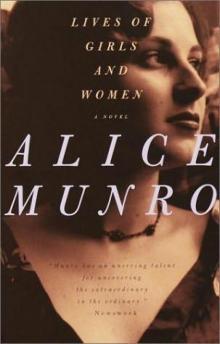 Lives of Girls and Women
Lives of Girls and Women Dance of the Happy Shades
Dance of the Happy Shades Open Secrets
Open Secrets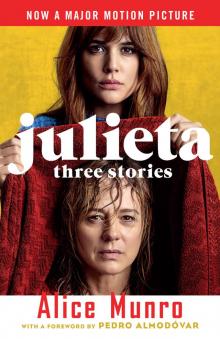 Julieta (Movie Tie-in Edition)
Julieta (Movie Tie-in Edition)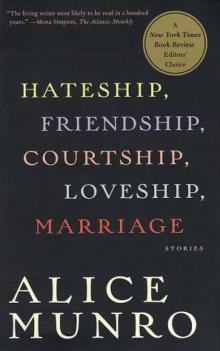 Hateship, Friendship, Courtship, Loveship, Marriage: Stories
Hateship, Friendship, Courtship, Loveship, Marriage: Stories Alice Munro's Best
Alice Munro's Best The Progress of Love
The Progress of Love Selected Stories
Selected Stories Away from Her
Away from Her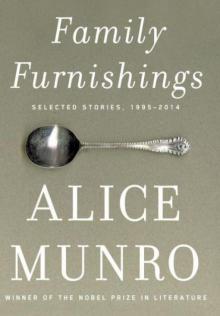 Family Furnishings
Family Furnishings Moons of Jupiter
Moons of Jupiter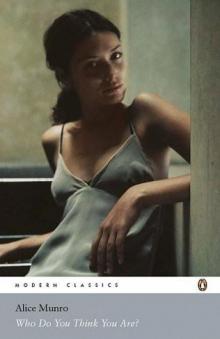 Who Do You Think You Are?
Who Do You Think You Are? Hateship, Friendship, Courtship, Loveship, Marriage
Hateship, Friendship, Courtship, Loveship, Marriage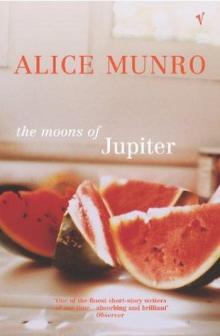 The Moons of Jupiter
The Moons of Jupiter Vintage Munro
Vintage Munro The Love of a Good Woman
The Love of a Good Woman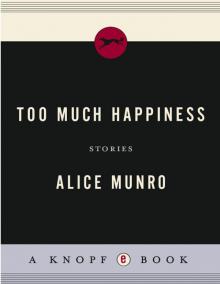 Too Much Happiness
Too Much Happiness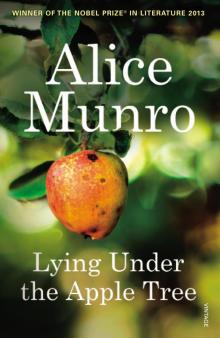 Lying Under the Apple Tree
Lying Under the Apple Tree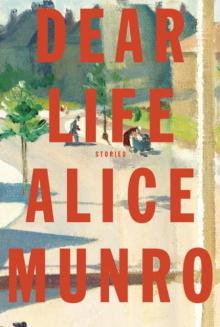 Dear Life
Dear Life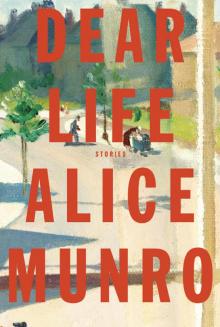 Dear Life: Stories
Dear Life: Stories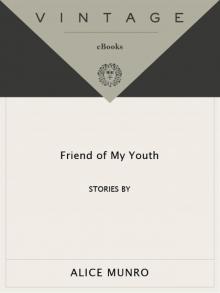 Friend of My Youth
Friend of My Youth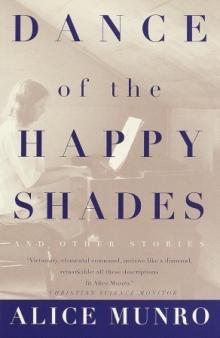 Dance of the Happy Shades: And Other Stories
Dance of the Happy Shades: And Other Stories The Beggar Maid
The Beggar Maid